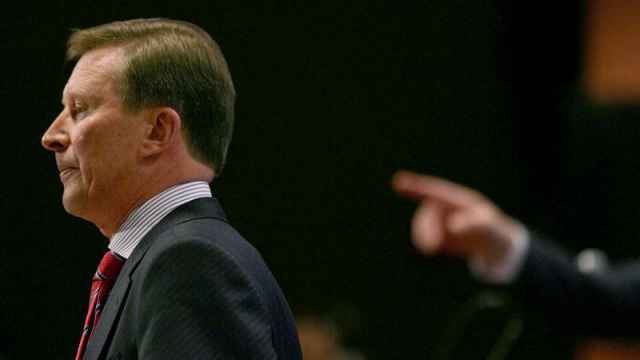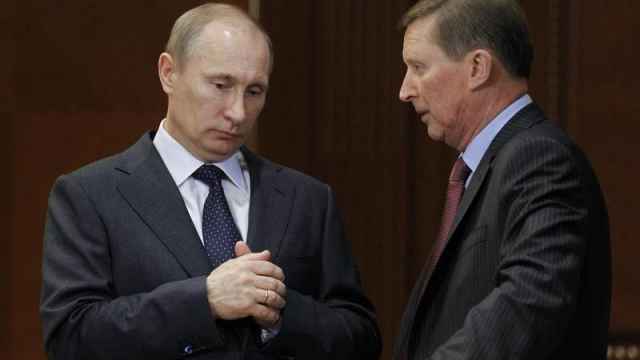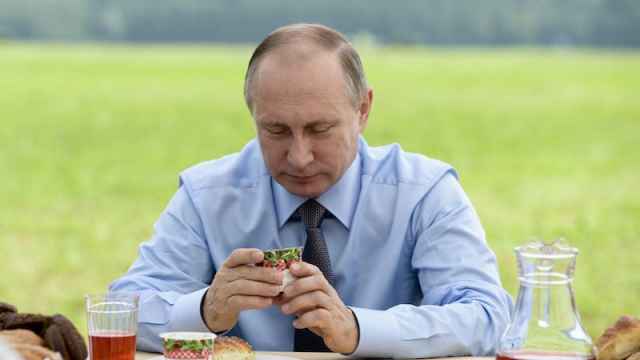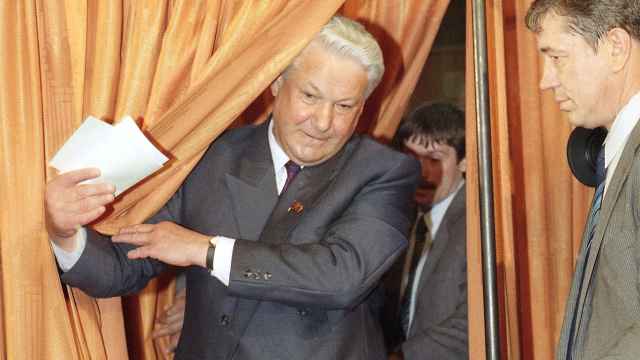The surprise replacement last week of Sergei Ivanov, a longtime ally of Russian President Vladimir Putin, with former head of protocol Anton Vaino as presidential chief of staff sparked a host of speculation, most of which can be safely disregarded. But, digging through the unfounded forecasts, one can find a clear message.
A comparison of Vaino’s credentials to those of Prime Minister Dmitry Medvedev suggests that he may well become the new prime minister. Like Vaino, Medvedev previously worked for the central government and was also known as a businesslike and responsible official. Like Vaino, Medvedev was presidential chief of staff and was not considered an independent figure. But the main point is that the regime needs to prepare a new generation of the elite to stand by Putin in 2018, when his current presidential term ends, and beyond. As chief of staff, Vaino will be instrumental in preparing this new wave of politicians.
Putin won’t take all of the members of the old guard with him in 2018, as demonstrated by the recent removals of officials like Russian Railways boss Vladimir Yakunin, drug tsar Viktor Ivanov, and others. The list of retired “friends” will only get longer. They will be replaced by a generation of special service operatives, security guards, and technocrat-apparatchiks in their forties and fifties.
They will be young enough to be approaching old age in 2024 — after which Putin is constitutionally barred from running for a third term — yet experienced enough to accompany Putin after 2018. They will be close to the boss, yet they will have enough distance to offer nothing but praise.
They will have enough savvy to navigate the Byzantine intrigue at the Kremlin and the presidential administration, but won’t be real politicians who can rival their overlord.
The president needs to be confident that the elite will be efficient enough to handle economic depression and possible political upheavals, and loyal enough to ensure that 2024 won’t bring any calamities, either to the country or to Putin himself.
Perhaps the presidential administration will start to look the way it’s supposed to under Vaino — simply the bureaucratic arm of the president. But the new young boss will certainly be besieged by political and financial clans rushing to pay their respects. Even if he simply obeys the president’s orders, Vaino will be viewed as Putin’s avatar. He automatically becomes as politically powerful as the prime minister, if not more so: Medvedev has already fulfilled the political task assigned to him, while Vaino is still on the rise.
Analysts have noted that Vaino’s grandfather, Karl Vaino, led Soviet Estonia from 1978 to 1988. However, Anton Vaino’s education at the Moscow State Institute of International Relations and his career as a diplomat are much more important. Russia’s current political regime heavily relies on military officers, security service operatives, and diplomats. Aided by their professional background, the new elites are ready to carry out any order issued by any government. And this is why discussions about the liberalization of Russian politics under Vaino are naïve.
Liberalization will happen only if the president orders it. No secret cabinet to develop or implement reforms exists, nor are reforms possible now in either Russia’s domestic or foreign policy.
Some have speculated Vaino’s ideological bias may exert influence on policy. The new chief of staff is the author of several esoteric research publications, and his coauthors are ultrapatriotic activists and proponents of “dynamic conservatism.” However, even if Vaino embraces these ideas, this will have no impact on Russia’s policy vector: it already more than satisfies all the “dynamic conservatives.”
On the day Sergei Ivanov resigned, Russian Railways paid its former head Yakunin a three-year bonus in a somewhat symbolic coincidence: The system takes care of those who leave on even relatively good terms.
The top elite are wealthy, which is only natural in a system where those in positions of power monetize their positions. But at a time of economic crisis, upcoming parliamentary elections, and the president’s looming last term, these elites need to be more humble and cautious. They need to heed public opinion, which is largely synonymous with Putin’s opinion.
After all, there are always replacements waiting in the wings. The rotation of the elite is not over. This is just the beginning.
Andrei Kolnesnikov is a senior associate and the chair of the Russian Domestic Politics and Political Institutions Program at the Carnegie Moscow Center.
This comment originally appeared on Carnegie Moscow's Eurasia Outlook blog.
A Message from The Moscow Times:
Dear readers,
We are facing unprecedented challenges. Russia's Prosecutor General's Office has designated The Moscow Times as an "undesirable" organization, criminalizing our work and putting our staff at risk of prosecution. This follows our earlier unjust labeling as a "foreign agent."
These actions are direct attempts to silence independent journalism in Russia. The authorities claim our work "discredits the decisions of the Russian leadership." We see things differently: we strive to provide accurate, unbiased reporting on Russia.
We, the journalists of The Moscow Times, refuse to be silenced. But to continue our work, we need your help.
Your support, no matter how small, makes a world of difference. If you can, please support us monthly starting from just $2. It's quick to set up, and every contribution makes a significant impact.
By supporting The Moscow Times, you're defending open, independent journalism in the face of repression. Thank you for standing with us.
Remind me later.







